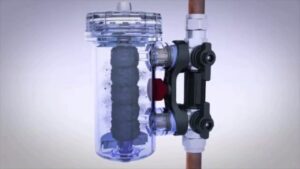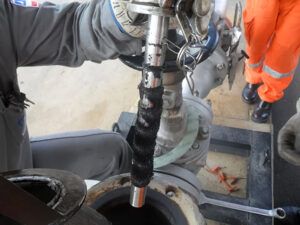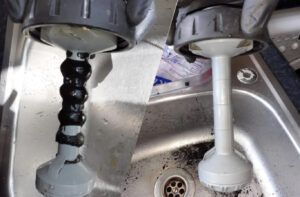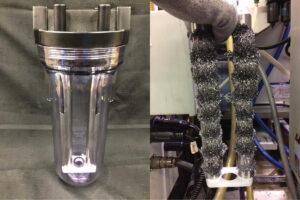What is a Magnetic Filter?
A magnetic filter is a filtration device that utilizes powerful magnets to remove ferrous contaminants from liquids. They work by directing fluid flow around high-strength magnetic rods or grids inside the filter housing. As the liquid passes through the strong magnetic field, ferrous particles are attracted to and held by the magnets while clean fluid flows out of the filter system.
In this article, as a professional magnetic filter manufacturer, I will share everything about magnetic filters, including the definition, related products, benefits and applications of them.

How Magnetic Filtration Works
Magnetic filters operate on a straightforward magnetic separation principle to remove ferrous contaminants from fluids. Here is a quick 4-step overview of how they work:
- Contaminated fluid enters the inlet of the magnetic filter housing. Inside, powerful neodymium or ferrite magnets create an intense magnetic field around the filter rods or grids.
- As fluid flows around the magnets, any iron particles are instantly attracted to and captured by the magnetic system while clean fluid passes through. This approach removes ferrous debris as small as 1-5 microns.
- Over time, the magnetic medium becomes saturated with collected debris, reducing its effectiveness. At this stage, the rod or grid assembly can be removed for cleaning via manual scraping or automatic flushing systems.
- Once cleaned, the magnetic filter element is replaced into the housing to resume filtration with maximum effectiveness. This cycle repeats each time the magnetics load to capacity.
By continually removing ferrous contaminants in this way, magnetic filters help maintain fluid quality, prevent machine wear from abrasive particles, reduce maintenance, and maximize component life.
Magnetic Filtration Systems and Products
There are various types and configurations of magnetic filters suitable for removing ferrous contamination from liquid systems:
- Rod filters use powerful magnetic rods enclosed in stainless steel tubes with machined fluid flow channels. They handle reasonably clean liquids including coolants, lubricants, and wash solutions with light debris loads.
- Drawer filters employ magnetic drawer assemblies making element removal/cleaning fast and easy. These filters handle heavily contaminated fluids like coolants and lubricants in demanding applications.
- Grid filters utilize magnetic grids placed perpendicular to the flow path to maximize filter area and debris holding capacity. Used in heavily contaminated liquids when high volume debris loading is expected.
- Self-cleaning filters feature automatic mechanisms to continuously remove collected debris from the magnetics so the unit can operate 24/7 without stopping. This approach is often used in critical production equipment.
Additional product configurations include magnetic strainers, fluid conditioners to prevent bacterial growth, chip conveyors, housings fabricated from various materials, and sensors to detect ferrous debris events. Custom designs are also available to meet specific application requirements if needed.
Advantages/Benefits of Magnetic Filtration
Compared to traditional barrier filtration methods using screens or cartridges, magnetic filters offer some key benefits:
No Consumables Needed
Once installed, magnetic filters operate indefinitely with no replacement cartridges, bags or other media required. The only wear item is the magnet material, which typically lasts for many years. Ongoing costs are near zero.
Handle Tough Contamination
Unlike barrier media filters with finite pore sizes that can block, magnetic filtration removes particles of ANY size, even submicron debris. So it handles challenging contamination that causes traditional filter blinding and failure.
Does Not Restrict Flow
With barrier filtration, achieving finer filtration requires smaller pore sizes, which increases pressure drop and flow restriction. But magnetic filters remove contaminants with zero flow obstruction, so full flow rates are always maintained.
Automatic Operation
Advanced self-cleaning magnetic filters can run 24/7 with no manual intervention required to dump debris. This ensures maximum uptime for continuous process equipment. Simple timers or PLC controls automate cleaning cycles.
Environmental Benefits
All collected debris can be easily removed from the magnetics and recycled for reuse rather than being discarded as consumable waste. This supports sustainability initiatives to reduce landfill waste.
Magnetic Filter Applications
Magnetic filtration protects all types of industrial fluids from fine ferrous particles that accelerate wear and lead to damage. Here are some equipment and process applications that benefit:
Machine Tool Coolant Filtration – Removes broken tool bits, metallic fines, grinding swarf, chips, and tramp oil from CNC machining coolants extending sump life.
Lubrication Filtration – Keeps hydraulic oils, lubricants, and greases free of wear inducing ferrous contamination from component wear debris and ingression.
Cutting Fluid Filtration – Protects machine cutting fluids from ferrous debris ingress and degradation thus maintaining viscosity and extending fluid life.
Grinding Fluid Filtration – Filters ferrous contamination from automotive and aerospace grinding fluids improving surface finish quality and process capability.
Powder & Bulk Material Protection – Safeguards powders and bulk solids from tramp metal to prevent extruder and mixer damage.
Pump Protection – Catches metallic particles from pump wear, pipe corrosion, and other sources to prevent impeller damage.
Parts Washing Fluid – Removes broken tool bits, machining chips, media fragments, and other debris from cleaning solutions.
Electronics Manufacturing – Protects sensitive electronics process equipment from ferrous ingress that can cause shorts or silicon wafer damage.
Pre-Filter Protection – Install magnetic filters upstream of finer barrier filtration stages to intercept large debris and prevent premature filter plugging or media damage.
Reusable Filter Aid – Allows reusable media filters like bag filters to operate longer between change-outs by capturing ferrous particles first.
Key Takeaways
Magnetic filtration is a proven, effective method to remove harmful ferrous contamination from liquids and powders across diverse industrial processes. The technology relies on high-intensity magnets to extract a wide range of debris sizes without flow restriction or consumables. Fully automated self-cleaning designs are available to minimize maintenance while supporting sustainability goals. With increasing manufacturing quality demands and equipment complexity, magnetic filters continue gaining expanded use worldwide – protecting critical production components, extending fluid life, reducing waste, and preventing unplanned downtime.





